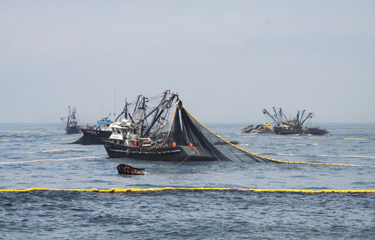Peruvian national prosecutor Sandra Silva Solsol has asked for the search and seizure of documents and property at the country’s Sea Institute (Imarpe), a specialized technical agency of the Ministry of Production (PRODUCE) that advises the state on marine conservation issues.
According to a document filed by the Public Ministry with the Superior Court of Justice of Callao, Imarpe is suspected of data adulteration related to the measurement of anchovy biomass, as well as the filtration of scientific information to industrial fishing companies. Scientific expedition surveys performed by Imarpe are used each year to determine the amount of biomass estimated to be available in national waters, which is then employed to define catch limits.
In its latest survey, Imarpe had reportedly determined that such mass reached 3.9 million metric tons (MT). However officials of that scientific institution are suspected of having inflated that number to 8.3 million MT to supposedly favor some industrial fishing companies, according to local press reports. Considering the Imarpe estimates, Peru established a fishing quota for the north-central region’s 2019 second season of 2.7 million MT, which industry players celebrated at the time, viewing the high limit as a possibility to return to the value they had in years passed. However, PRODUCE declared a premature close to that season due to the presence of a high number of juveniles in catchments, which had prompted several hundred fishermen to protest against what they viewed as the ministry’s failure to protect anchovy resources.
In reaction, Peru’s executive branch submitted an emergency decree on 22 January aiming to modify the law that led to the creation of Imarpe.
In the latest turn of events, the deputy attorney general specializing in corruption offenses, Yudith Villegas Espinoza, has instructed the provincial criminal prosecutor of Callao to initiate an investigation against four Imarpe officials – scientific director Renato Guevara Carrasco, hydroacoustics and remote sensor research director Ramiro Castillo Valderrama, pelagic resources research director Miguel Ñiquén Carranza, and hydroacoustics department biologist Luis La Cruz Aparco - as well as against fishing companies Tecnológica de Alimentos (TASA), CFG Investment, Pesquera Diamante, and Pesquera Exalmar.
Evidence of scientific data being filtered to companies affiliated with Peru’s National Fisheries Society (SNP) reportedly include phone conversations, WhatsApp messages, and personal interviews in which Imarpe personnel delivered information to former Imarpe employees that now work for the industrial fishing firms.
SNP head Cayetana Aljovín remained nonplussed about the accusation.
“I’d say that it is not a matter of concern,” she told Peruvian newspaper Expreso. “We are all subject to the investigation and it will surely result in finding nothing criminal. I am confident [that no SNP affiliated company is involved] because we apply a very strict code of ethics. And by virtue of that code, we have precisely applied our compliance process. We are currently in a procedure to collect all the necessary and useful information. So far we have not found anything that raises concern.”
However, PRODUCE authorities said they have evidence from their initial investigations that data was tampered and the computer in which that data was stored was manipulated to eliminate evidence. During its investigation, it made an unannounced visit to Imarpe headquarters to question employees there about some of the data it had seen regarding the anchovy biological survey. When it returned a day later, the information was no longer available as "the equipment was formatted … and the procedure was carried out by the [Pelagic Resources Population Dynamics] user area without authorization from the IT department," according to the Public Ministry document.
In light of the accusations, several members of the international scientific community signed a statement in support of Imarpe, highlighting the entity’s scientific achievements during its more than 50 years of existence, which contributed to Peruvian fishery sector sustainability, and calling the ongoing situation an “unfounded smear campaign.”
“We are convinced that those who look to discredit Imarpe, including certain press and other media, lack the fundamental knowledge to objectively analyze the procedures and differences between the various observation and evaluation methods available to Imarpe. However, they are still allowed to delineate and spread hypotheses of conspiracy that deeply damage people, the institute, the fishing sector and the country in general,” the statement said. “Every hint of slander and every attempt to destroy its credibility with unsubstantiated attacks should be rejected.”
The statement called for an international panel of experts to analyze all the information related to this case. The signees include Jorge Csirke, former Imarpe official and former director of the of Fisheries and Aquaculture Management Division at the UN’s Food and Agriculture Organization of the United Nations (FAO); Mariano Gutiérrez, former Imarpe official and scientific director of Peru’s Humboldt Institute for Marine and Aquaculture Research (IHMA); Francisco Chavez, senior scientist at the Monterrey Bay Aquarium Research Institute (MBARI); Paul Fernandes, School of Biological Sciences, fisheries science chair, University of Aberdeen, Scotland; Ray Hilborn, School of Fisheries and Aquatic Sciences, University of Washington; Lauro Madureira, Institute of Oceanography at Brazil’s Federal University of Rio Grande (FURG); Francois Gerlotto, former research director of France’s Development Research Institute (IRD); Pierre Fréon, IRD’s former director emeritus of research; Anne Lebourges-Dhaussy, IRD’s director of engineering research; Arnaud Bertrand, IRD research director; Renato Salvatecci, Geosciences Institute, University of Kiel, Germany; and Sophie Bertrand, IRD research director.
In the past, Imarpe has been recognized by international organizations such as the FAO and the Economic Commission for Latin America and the Caribbean (ECLAC), as well as the World Bank and the OECD, for its management of fishery resources.
According to FAO, Peru is the world’s main producer and exporter of fishmeal and fish oil, by a far margin over other producing countries. In 2018, Peru exported 1.03 million MT of fishmeal, about 72 percent more than in 2017. Nearly 80 percent of the Peruvian exports were destined for China.
Photo courtesy of Sociedad Nacional de Pesquería







